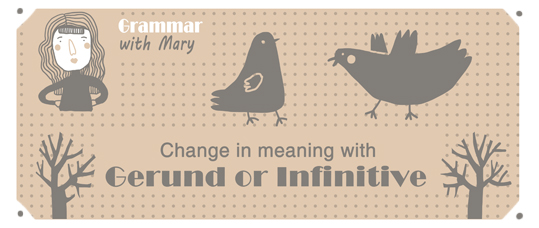Change in meaning with Gerund or Infinitive
Hey, guys!
How's life? Mine's sort of difficult today, I forgot to set my alarm clock, so I overslept and was late for work. But things happen, don't they?
So, I forgot to… what? To set my alarm. To set – what form is this? It's the infinitive, right?
We have “forget”, and then “to+inf”. This is called a verb pattern; we have two verbs one after another. The first verb shows the tense, and the second verb gives us more information about the action. When we change the tense of the main verb, we don't touch the second verb.
In this case we used the infinitive after “forget”. Tell me please, did I actually set the alarm? Nope, I didn't. I forgot to do it. So we use the infinitive after “forget” to talk about something that you didn't do because you forgot all about it.
What have you forgotten to do this week? Nothing? I don't believe you.
Have I already told you about my alarm clock? Oh, yes, of course I have. Sorry, I forgot telling you about my alarm clock. In this case we used the gerund (verb with an –ing ending) form after “forget”. Did I tell you about my clock? Yes. But I forgot that I had already done it. When we did something and then forgot about doing it, we use the gerund form after “forget”.
Have you ever forgotten salting the soup?
The same thing goes for “remember”.
I remember telling you about my morning. Remember + gerund, right? I told you about my morning, and I remember it. In this case we use the gerund form of the verb after “remember”.
Do you remember reading about the verb “forget”?
My friends told me this morning: “Remember to set your alarm clock for tomorrow!”
Have I already set my alarm clock? No, I haven't. My friend reminded me that I still need to do it. When we use the infinitive after “remember”, we talk about something that we still need to do, first we remember this and then we do it.
Remember to have some rest tonight!
Have you ever tried eating something strange, like frogs? I haven't. But I would like to try eating frog meat, it should be an interesting experience.
What form did I use after “try”? Eating. Right. Gerund.
We use the gerund after “try” when we do something for an experiment, to see what happens.
Have you ever tried putting a lightbulb in the microwave? It's really interesting!
I tried to work today, but it was really difficult, because the weather was so nice outside and I wanted to go for a walk.
Tell me please, what form did we use after “try” in this example? The infinitive form.
We use the infinitive form after “try” when we make an effort to do something difficult.
Have you ever tried to lift a car? Well, don't, it's really heavy.
Just before writing this I stopped working. I stopped for a break fro work before I was really tired.
So, in this example: I stopped working, what form did we use after “stop”? The gerund form, good job! So, in this case, I was working for some time, then I stopped doing it. So I wasn't working any longer, I stopped.
We use “gerund” after “stop” to talk about something that we don't do anymore.
Have you ever stopped doing something you really liked? If yes, why did you stop?
I stopped to take a break.
I was working, then I stopped because I wanted to take a break. We use the infinitive after “stop” in this case, don't we?
We use the infinitive after “stop” when we stop something because we want to do something else. We show the reason WHY we stopped.
Do you ever stop to have a cup of coffee?
Well, it's been really nice talking to you, guys, but now I have to run. See ya later!
















